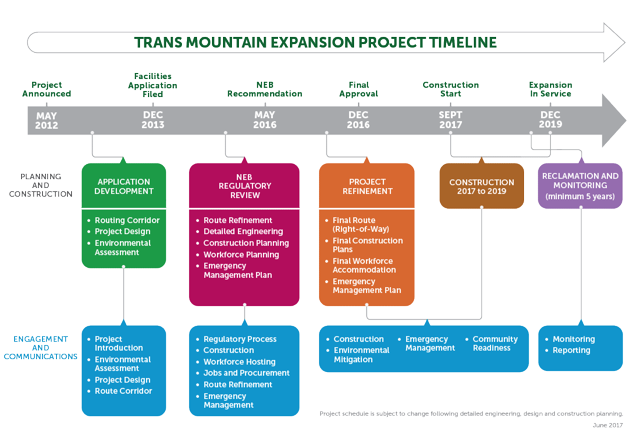Author(s): Jesse Donovan
Media Outlet: Seeking Alpha
Summary
- The Kinder Morgan Trans Mountain Pipeline Expansion Project (the Expansion Project) faces considerable political and legal uncertainty in the near future.
- Investors will benefit from an understanding of the current political landscape, the nature of constitutionally protected Indigenous rights, and the history of environmental activism in British Columbia.
- British Columbia is characterized by unique political, legal, and social factors that create a substantial risk that the Expansion Project will be abandoned.
Kinder Morgan (NYSE:KMI) faces a high degree of risk in the near future as it proceeds with large-scale construction of pipeline infrastructure in British Columbia, Canada. Accordingly, it is unwise to buy or hold shares in Kinder Morgan. This argument is further supported by the recent heavy cuts to Kinder Morgan's dividend. Kinder Morgan is a quintessential case of a high-risk/low-reward investment.
The Expansion Project
Canada approved the twinning of Kinder Morgan's existing Trans Mountain Pipeline on Nov. 29th, 2016. The Expansion Project, if completed, will increase the capacity of the system from 300,000 BPD to 890,000 BPD. As detailed below, the Expansion Project will take just over two years from the start of construction to the operation of the new segment of the system.

Kinder Morgan Canada Ltd. raised $1.75 billion (NYSEARCA:CAD) on May 30th, 2017, in an IPO priced at $17 per share. The issue price was lower than the originally planned price of $19 to $21.
B.C.'s Political Landscape
The political landscape in British Columbia endured a seismic shift on May 9th, 2017, when the Green and New Democrat parties together captured the majority of the seats in the provincial legislature. The previous provincial government had approved the Expansion Project in early 2017. The Green and New Democrats, however, formed a governing agreement and vowed to oppose the Expansion Project by any means necessary.

The Green and New Democrat parties are now poised to take power in British Columbia and will present a powerful obstacle to the complete of the Expansion Project. West Coast Environmental Law recently released a reportdescribing several actions which can be taken by the provincial government to slow down the progress of the Expansion Project. Even if the provincial government fails to halt the Expansion Project, interminable delays and external market forces might create considerable risk.
Relevant Legal Factors
The main obstacle to the completion of the Expansion Project might arise from the opposition of Indigenous groups in British Columbia. Union of British Columbia Indian Chiefs Grand Chief Stewart Phillip stated that "Kinder Morgan's Trans Mountain Pipeline expansion project will never see the light of day." Furthermore, over 100 Indigenous groups from across the country signed a treaty, pledging to resist the construction of the Expansion Project.
Unlike in the U.S., Indigenous peoples in Canada benefit from constitutional recognition and protection of their rights. In 2014, the Supreme Court of Canada declared the existence of Aboriginal title in a vast swath of territory in central British Columbia. In short, Aboriginal title grants the title holder the right to exclusively occupy the land and decide what uses the land is put to. The Supreme Court has stated that there are "hundreds of indigenous groups in British Columbia with unresolved land claims." The Expansion Project crosses the traditional territories of multiple Indigenous groups.

Ten legal challenges from Indigenous groups have already been filed against the federal government's approval of the Expansion Project. Furthermore, an environmental organization has recently raised almost $500,000 to support litigation against the Expansion Project. Ongoing litigation against the Expansion Project should be thoughtfully considered by any prudent investor considering Kinder Morgan.
British Columbian Environmentalism
The potential impact of large-scale civil disobedience must be considered. In the winter of 2014, over one hundred protesters were arrested for protesting against exploration work being undertaken to prepare for the Expansion Project. Among those arrested was Grand Chief Stewart Phillip. The confluence of environmental and Indigenous activism deserves consideration. Protests against the Expansion Project continued into 2015 and 2016.
British Columbia has long been a hotbed of environmental and Indigenous activism. In 1993, for example, mass civil disobedience took place on Vancouver Island, British Columbia as protesters successfully blocked forestry operations in a sensitive ecological area. In scenes that gripped the nation, over 300 activists were arrested in a single day. Two years later, the Gustafsen Lake standoff erupted as paramilitary forces descended on Indigenous activists who had occupied a tract of land considered sacred. More recently, Indigenous and environmentalist activists erected a blockade and evicted pipeline workers and members of the Royal Canadian Mounted Police. This brief sample of historical British Columbian environmentalism demonstrates a potential risk to the completion of the Expansion Project.
Counterargument
While numerous potential obstacles stand in the way of completion of the Expansion Project, the political will to complete the project might still exist. The Prime Minister of Canada, for example, has continued to ardently supportthe Expansion Project. The Minister of Natural Resources Jim Carr suggestedthat the military could be used against protesters. This demonstrates the lengths that the federal government might go to in order to complete the expansion. Furthermore, the successful completion of the IPO might demonstrate that investors are willing to shoulder unexpected costs that might arise.
Kinder Morgan might succeed in attracting Indigenous support by signing agreements that allow Indigenous groups to hold equity stakes in the Expansion Project. The federal government has signaled that it would consider supporting Indigenous groups who wish to enter into such agreements with the company.
Conclusion
A recent Seeking Alpha article, "Kinder Morgan: Pure Confidence," expressed a high degree of confidence in the completion of the Expansion Project. Respectfully, the author seems to have disregarded the turbulent political landscape, recent legal developments, and British Columbia's propensity for environmental activism.
The success of Kinder Morgan as a company does not depend on the completion of the Expansion Project. Nonetheless, investors should become acquainted with the unique circumstances present in British Columbia that might imperil Kinder Morgan's $7.4 billion investment.
Disclaimer: Any information contained in this article should be considered general information and does not constitute legal or professional advice.
Disclosure: I/we have no positions in any stocks mentioned, and no plans to initiate any positions within the next 72 hours.
I wrote this article myself, and it expresses my own opinions. I am not receiving compensation for it (other than from Seeking Alpha). I have no business relationship with any company whose stock is mentioned in this article.